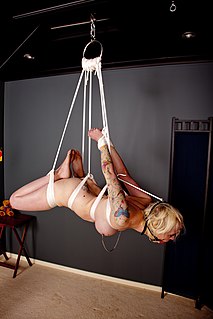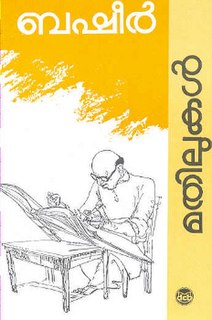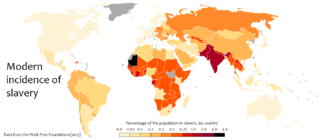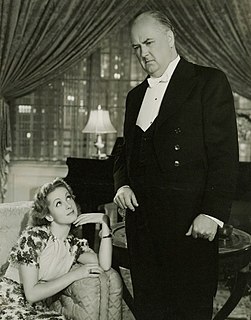This page is based on this
Wikipedia article Text is available under the
CC BY-SA 4.0 license; additional terms may apply.
Images, videos and audio are available under their respective licenses.

Bondage pornography is the depiction of sexual bondage or other BDSM activities using photographs, stories, movies or drawings. Though often described as pornography, the genre involves the presentation of bondage fetishism or BDSM scenarios and does not necessarily involve the commonly understood pornographic styles. In fact, the genre is primarily interested with the presentation of a bondage scene and less with depictions of sexuality, such as nudity or sex scenes, which may be viewed as a distraction from the aesthetics and eroticism of the bondage scenario itself.

Debt bondage, also known as debt slavery or bonded labour, is the pledge of a person's services as security for the repayment for a debt or other obligation, where the terms of the repayment are not clearly or reasonably stated, and the person who is holding the debt and thus has some control over the laborer, does not intend to ever admit that the debt has been repaid. The services required to repay the debt may be undefined, and the services' duration may be undefined, thus allowing the person supposedly owed the debt to demand services indefinitely. Debt bondage can be passed on from generation to generation.

In the BDSM subculture, Bondage is the practice of consensually tying, binding, or restraining a partner for erotic, aesthetic, or somatosensory stimulation. A partner may be physically restrained in a variety of ways, including the use of rope, cuffs, bondage tape, or self-adhering bandage.

Dangerous is a 1935 American drama film directed by Alfred E. Green and starring Bette Davis in her first Oscar-winning role. The screenplay by Laird Doyle is based on his story Hard Luck Dame.

Irving Klaw,, self-named the "Pin-up King," was an influential American merchant of sexploitation, fetish, and Hollywood glamour pin-up photographs and films. Like his predecessor, Charles Guyette, who was also a merchant of fetish-themed photographs, Klaw was not a photographer, but a merchandiser of fetish art imagery and films. His great contribution to the world was to commission fetish art and sponsor illustrative artists, and to indirectly promote the legacy of Charles Guyette and John Willie. Irving Klaw is a central figure in what fetish art historian Richard Pérez Seves has designated as the "Bizarre Underground," the pre-1970 fetish art years.
Elwood Dager Cromwell, known as John Cromwell, was an American film and stage director and actor. His films spanned the early days of sound to 1950s film noir, when his directing career was cut short by the Hollywood blacklist.

Mathilukal is a Malayalam novel written by Vaikom Muhammad Basheer in 1965. It is one of the most cherished and well-known love stories in Malayalam. Its hero, Basheer himself, and heroine, Narayani, never meet, yet they love each other passionately. Despite being imprisoned and separated by a huge wall that divides their prisons, the two romance each other.

Women in Bondage is a 1943 World War II film about conditions for women under Hitler's regime. The plot involves two women imprisoned for speaking out against the government. It was directed by Steve Sekely and starred Gail Patrick and Nancy Kelly.

This is an index of BDSM articles. BDSM is a variety of erotic practices involving dominance and submission, role-playing, restraint, and other interpersonal dynamics. Given the wide range of practices, some of which may be engaged in by people who do not consider themselves as practicing BDSM, inclusion in the BDSM community or subculture is usually dependent on self-identification and shared experience. Interest in BDSM can range from one-time experimentation to a lifestyle.

Debt bondage in India or Bandhua Mazdoori was legally abolished in 1976 but it remains prevalent, with weak enforcement of the law by governments. Bonded labour involves the exploitive interlinking of credit and labour agreements that devolve into slave-like exploitation due to severe power imbalances between the lender and the borrower.

Clarence Kolster was an American film editor, active during the later years of the silent era, right through the 1950s. Born in Plattsburgh, New York in 1895, he began his film career editing the 1922 silent film, Rags to Riches. In the more than thirty years of his career, he would edit almost 100 films, as well as his sole directing foray, as the assistant on the 1924 silent film, The Lighthouse by the Sea. His career would include such classics as The Painted Desert, also in 1931, which featured Clark Gable's first speaking role; the 1946 remake of Of Human Bondage; Always Leave Them Laughing, starring Milton Berle and Virginia Mayo; and 1958's Our Miss Brooks starring Eve Arden.

Charles Pearce Coleman was an Australian-born American character actor of the silent and sound film eras.

Harry Allen, born in Sydney, New South Wales, was an Australian-born American character actor of the silent and sound film eras.
















